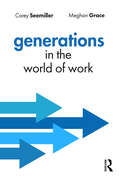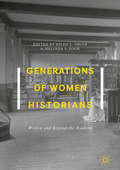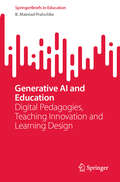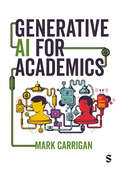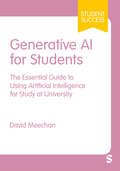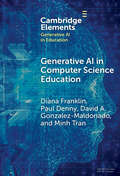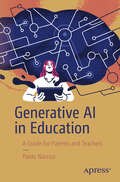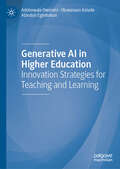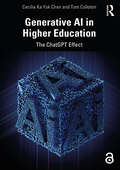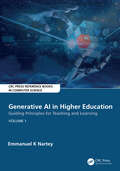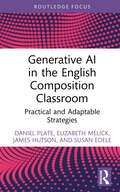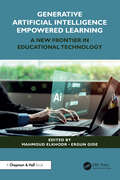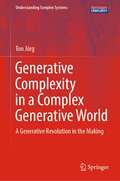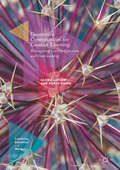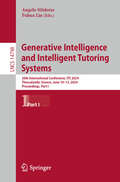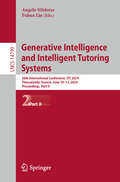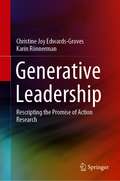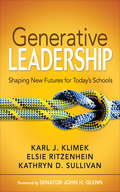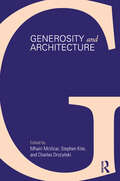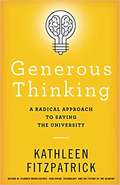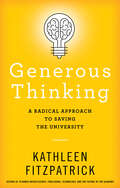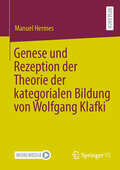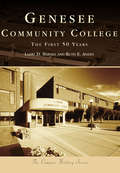- Table View
- List View
Generations in the World of Work
by Corey Seemiller Meghan GraceGenerations in the World of Work provides invaluable data-informed insights into the intergenerational dynamics in today’s workplaces.Generational experts and authors of Generation Z: A Century in the Making, Corey Seemiller and Meghan Grace present the perceptions, motivations, and preferences of various generational cohorts and share how those shape individual behaviors, communication and collaboration, as well as wider organizational structures and norms. They offer guidance for how to maximize productivity and relationships to navigate dynamics across generational cohorts.Generations in the World of Work offers employees, managers, and organizational leaders guidance for maximizing productivity, relationships, wellbeing, and engagement across generational differences in order to create thriving workplaces that value and leverage each person’s strengths.
Generations of Women Historians: Within and Beyond the Academy
by Melinda S. Zook Hilda L. SmithThis collection focuses on generations of early women historians, seeking to identify the intellectual milieu and professional realities that framed their lives. It moves beyond treating them as simply individuals and looks to the social and intellectual forces that encouraged them to study history and, at the same time, would often limit the reach and define the nature of their study. This collection of essays speaks to female practitioners of history over the past four centuries that published original histories, some within a university setting and some outside. By analysing the values these early women scholars faced, readers can understand the broader social values that led women historians to exist as a unit apart from the career path of their male colleagues.
Generative AI and Education: Digital Pedagogies, Teaching Innovation and Learning Design (SpringerBriefs in Education)
by B. Mairéad PratschkeThis volume addresses the gap in knowledge around generative AI and its applications in education. It draws on the recent history of technological innovation and digital pedagogies, locating generative AI in the contemporary discourse around education futures. It argues that a new hybrid model of education is emerging, requiring educational institutions to embed generative AI into course and programme design, delivery and assessment. It also proposes a shift from a focus on learning as output to learning as a process, and explores what that shift might look like. Grounded in educational theory, it offers actionable pedagogy-informed guidance on how to position AI as a collaborator in the construction of learning in a manner that is congruent with the values and aims of education. It offers advice based on evidence-based digital pedagogy, including frameworks for effective teaching and learning with generative AI, that enable educators and designers to put these ideas into practice. The book also explores the wider context informing this shift, connecting narratives from governments and industry leaders on the strategic importance of generative AI and lifelong learning, learning agility, and future skills that make the case for the integration of competency-based assessment into mainstream education. Finally, going beyond pedagogy and practice, it considers of some of the broader issues, including limitations and ethics, and the implications of integrating generative AI into institutional planning and design, and includes a sample roadmap for education leaders to start the process of integrating generative AI into their institutions. This work approaches the topic of generative AI from the vantage point of educators by addressing themes and concerns that will resonate with professionals in the sector.
Generative AI for Academics
by Mark CarriganThis is your indispensable guide to navigating the rise of generative AI as an academic. It thoughtfully explores rapidly evolving AI capabilities reshaping higher education, examining challenges and ethical dilemmas across the sector. It provides useful strategies for using generative AI in your scholarly work while upholding professional standards. This practical guidance addresses four core areas of academic work: Thinking: How to use generative AI to augment individual and collaborative scholarly thinking that can assist in developing novel ideas and advancing impactful projects Collaborating: Explore how generative AI can be used as a research assistant, coordinating teams and enhancing scholarly cooperation Communicating: Cautioning against over-reliance, examine how generative AI can relieve communication burdens while maintaining professionalism and etiquette Engaging: thoughtful and practical frameworks are offered for using these developments to support online engagement without sacrificing scholarly principles Mark Carrigan is a digital sociologist, author and Lecturer in Education at the University of Manchester.
Generative AI for Academics
by Mark CarriganThis is your indispensable guide to navigating the rise of generative AI as an academic. It thoughtfully explores rapidly evolving AI capabilities reshaping higher education, examining challenges and ethical dilemmas across the sector. It provides useful strategies for using generative AI in your scholarly work while upholding professional standards. This practical guidance addresses four core areas of academic work: Thinking: How to use generative AI to augment individual and collaborative scholarly thinking that can assist in developing novel ideas and advancing impactful projects Collaborating: Explore how generative AI can be used as a research assistant, coordinating teams and enhancing scholarly cooperation Communicating: Cautioning against over-reliance, examine how generative AI can relieve communication burdens while maintaining professionalism and etiquette Engaging: thoughtful and practical frameworks are offered for using these developments to support online engagement without sacrificing scholarly principles Mark Carrigan is a digital sociologist, author and Lecturer in Education at the University of Manchester.
Generative AI for Students: The Essential Guide to Using Artificial Intelligence for Study at University (Student Success)
by David MeechanHow can you make the most of Generative AI at college or university? Using Generative Artificial Intelligence as a student can be confusing and challenging. This authoritative guide equips you with the practical knowledge to confidently leverage Generative AI as a powerful study aid . Exploring a wide spectrum of topics, from demystifying jargon and fostering critical thinking to addressing diversity, inclusion and academic integrity, this book is an essential companion for any student looking to enhance their academic skill set and achieve success in their studies. By the end of this book you will: - Become critically literate at using Generative AI - Understand what the ethical use of Generative AI looks like in practice - Learn how to use Generative AI to enhance traditional study methods - Encounter real-life case studies and worked-through examples to put theory into practice - Gain a comprehensive grounding in how to engage with Generative AI Tools
Generative AI for Students: The Essential Guide to Using Artificial Intelligence for Study at University (Student Success)
by David MeechanHow can you make the most of Generative AI at college or university? Using Generative Artificial Intelligence as a student can be confusing and challenging. This authoritative guide equips you with the practical knowledge to confidently leverage Generative AI as a powerful study aid . Exploring a wide spectrum of topics, from demystifying jargon and fostering critical thinking to addressing diversity, inclusion and academic integrity, this book is an essential companion for any student looking to enhance their academic skill set and achieve success in their studies. By the end of this book you will: - Become critically literate at using Generative AI - Understand what the ethical use of Generative AI looks like in practice - Learn how to use Generative AI to enhance traditional study methods - Encounter real-life case studies and worked-through examples to put theory into practice - Gain a comprehensive grounding in how to engage with Generative AI Tools
Generative AI in Computer Science Education: Challenges and Opportunities (Elements in Generative AI in Education)
by Paul Denny Diana Franklin David A. Gonzalez-Maldonado Minh TranGenerative AI is a disruptive technology that has the potential to transform many aspects of how computer science is taught. Like previous innovations such as high-level programming languages and block-based programming languages, generative AI lowers the technical expertise necessary to create working programs, bringing the power of computation to more people. The programming process is already changing as a result of its presence, even for expert programmers. It also poses significant challenges to educators around re-thinking assessment as some well-established approaches may no longer be viable. Many traditional programming assignments can be completed using generative AI tools with minimal effort, thus potentially undermining learning. In this Element, the authors explore both the opportunities and the challenges for computer science education resulting from the widespread availability of generative AI.
Generative AI in Education: A Guide for Parents and Teachers
by Paolo NarcisoAs artificial intelligence (AI) rapidly transforms education, tools like ChatGPT and Claude are revolutionizing the way we teach and learn. This book is a groundbreaking book that empowers parents and students to navigate this exciting new frontier, filling a critical gap in the current literature. As the first comprehensive guide to generative AI in education designed for parents and students, Generative AI in Education is positioned to become an indispensable resource. It provides the knowledge and strategies needed to effectively integrate AI into their learning journeys, transforming educational outcomes and preparing students for success in a rapidly changing world. You’ll gain a deep understanding of how tools like ChatGPT and Claude work, and how they can be leveraged to support learning across various subjects and grade levels. You’ll then see how to create clear, specific, and engaging prompts that elicit valuable responses from AI-powered tools. This book contains all the techniques for tailoring prompts to different learning objectives, styles, and contexts, and how they can use AI tools to support reading comprehension, writing skills, problem-solving, and creative thinking. What You Will Learn Apply generative AI in education Craft effective prompts for personalized learning experiences Utilize AI tools to support learning, creativity, and problem-solving Who This Book is For Parents and students who are eager to harness the power of generative AI to enhance learning experiences and prepare for success in an AI-driven future
Generative AI in Higher Education: Innovation Strategies for Teaching and Learning
by Abiodun Egbetokun Oluwaseun Kolade Adebowale OwoseniWith the integration of generative artificial intelligence (AI), teachers and learners now have access to powerful tools to enhance their productivity and effectiveness in their work. To meet the demands of this dynamic educational landscape, teachers must embrace AI to handle repetitive tasks, freeing them to focus on more intelligent and humanistic responsibilities. For learners, responsible use of AI could make learning more fun, personalized, flexible, and enriching. This insightful new book explores the evolving role of educators in higher education in a world of rapid technological advancements and provides a practical outline of the available technologies. By integrating Generative AI into teaching and learning, Higher Education Institutions can contribute to achieving inclusive and equitable quality education, a target of the UN Sustainable Development Goals, and promote lifelong learning opportunities for all. Generative AI can be used to enhance teaching and learning experiences, foster creativity, and develop new learning experiences in higher education. This book is a valuable resource for educators navigating the ever-changing landscape of education technology. With scientific background, practical insights and actionable tips, this book will be of interest to scholars of emerging technologies and innovation in education. It will also be of practical use to instructors seeking to harness the power of generative AI, enhancing productivity and transforming their approach to personalized learning.
Generative AI in Higher Education: The ChatGPT Effect
by Cecilia Ka Chan Tom CollotonChan and Colloton’s book is one of the first to provide a comprehensive examination of the use and impact of ChatGPT and Generative AI (GenAI) in higher education.Since November 2022, every conversation in higher education has involved ChatGPT and its impact on all aspects of teaching and learning. The book explores the necessity of AI literacy tailored to professional contexts, assess the strengths and weaknesses of incorporating ChatGPT in curriculum design, and delve into the transformation of assessment methods in the GenAI era. The authors introduce the Six Assessment Redesign Pivotal Strategies (SARPS) and an AI Assessment Integration Framework, encouraging a learner-centric assessment model. The necessity for well-crafted AI educational policies is explored, as well as a blueprint for policy formulation in academic institutions. Technical enthusiasts are catered to with a deep dive into the mechanics behind GenAI, from the history of neural networks to the latest advances and applications of GenAI technologies.With an eye on the future of AI in education, this book will appeal to educators, students and scholars interested in the wider societal implications and the transformative role of GenAI in pedagogy and research.
Generative AI in Higher Education: Volume 1 (CRC Press Reference Books in Computer Science)
by Emmanuel K NarteyDivided into two volumes, this book develops guiding principles for higher education institutions to use GenAI effectively and ethically in teaching and learning, articulating a roadmap for implementation at institutional levels and addressing the conundrum of using GenAI in higher education. As higher education institutions take different attitudes and approaches to Generative AI (GenAI), with some viewing it as a threat to academic integrity and therefore banning its use, while others have embraced it as an innovation to academic practice and have implemented guidance on how to use it ethically, this book makes clear that GenAI, such as ChatGPT, is not the problem itself; the issue is how we engage with it.
Generative AI in the English Composition Classroom: Practical and Adaptable Strategies (Routledge Research in Writing Studies)
by James Hutson Daniel Plate Elizabeth Melick Susan EdeleDesigned to cater to the needs of both novice and seasoned writing instructors, this book provides a range of practical and adaptable strategies for integrating generative artificial intelligence (AI) into English writing curricula.Generative AI in the English Composition Classroom proposes strategic methodologies to ensure that AI is utilized as a facilitator of learning and creativity, rather than as a shortcut to academic success. With a particular emphasis on sophisticated large language models such as Claude, ChatGPT, and Gemini, this book critically addresses potential challenges, including concerns related to academic integrity. It includes case studies and practical strategies to exemplify how AI can enhance the writing process while emphasizing the continuing importance of a solid foundation in writing structure, processes, and rhetorical strategies. These case studies and strategies are designed for immediate application, offering educators and students practical tools to effectively navigate AI-augmented writing environments. Finally, the book looks to the future, discussing the evolving skillsets required in the workforce and how educators can equip students for a future in which AI is an integral component.A forward-thinking and invaluable guide, this book will be of interest to educators involved in teaching English Composition and writing.
Generative Artificial Intelligence Empowered Learning: A New Frontier in Educational Technology
by Mahmoud Elkhodr Ergun GideThis book explores the integration of Generative Artificial Intelligence (GenAI), such as ChatGPT, into educational practices and research methodologies. With the potential to transform traditional learning environments, this book addresses both the opportunities and challenges that come with leveraging GenAI for enhancing teaching and learning experiences.This comprehensive guide delves into multiple aspects of GenAI in education. It covers critical topics such as project-based learning (PBL), personalized learning through AI, AI-driven student assessment, and the role of AI in special education. Furthermore, it examines ethical considerations, the readiness of students and teachers for AI technologies, and case studies on AI’s impact on student outcomes. With insights from educators, researchers, and practitioners from around the globe, the book provides a balanced perspective on both theoretical frameworks and practical implementation of GenAI technologies.Ideal for educators, researchers, and policymakers, this book serves as a practical resource for those looking to effectively integrate AI into their pedagogical and research efforts. It is an essential reference for anyone interested in staying at the forefront of educational innovation and exploring the future possibilities of AI-empowered learning.
Generative Complexity in a Complex Generative World: A Generative Revolution in the Making (Understanding Complex Systems)
by Ton JörgThis book introduces a refreshing approach to twenty-first-century scientific approach in an age, which is also known as the Century of Complexity. It deals with the deep problem of complexity, being operative from the bottom-up. The current lack of understanding of complexity has led scholars into the so-called embarrassment of complexity. A long overdue paradigm shift is necessary to address complexity as generative complexity and brings readers to the edge of a scientific revolution: that is, a generative revolution in the Century of Complexity. The book offers a radical shift of paradigm from the paradigm of simplifying into the new generative paradigm of complexifying about processes that develop from the bottom-up. The book links complex generative reality with a corresponding radical new generative nature of order and explores new fronts in science. This book explores innovative concepts of interaction, of causality, of the unit of study, and of reality itself and enables readers to see complexity as generative, emergent complexity as being operative from the bottom-up. The book discusses and suggests solutions for the problem of complexity in this Century of Complexity. The author provides a new understanding of complexity based on a generative flux of forces and relations. The book aims to bring about a fundamental and foundational change in how we view and ‘do’ science for an interdisciplinary audience of academics ranging from social science and humanities to economy and biology.
Generative Conversations for Creative Learning
by Robyn Ewing Gloria LathamThis book builds on conversations between the author educators and other experts in the field, including authors, illustrators and teachers, to explore the benefits of discussions around quality literature within a classroom context that exercises the imagination and generates new ideas and discoveries. The book focuses on a range of strategies that can be utilised to reimagine literacy learning in a 21st century context including parent and teacher talk; active listening; fostering student driven questions; building vocabulary and imagery; and metacognitive talk. These are argued to have a hugely beneficial impact on how children learn to solve problems, engage in complex thought processes, negotiate meaning, as well as learning how to wonder, explore, create and defend ideas. The book also defends the importance of parents, teachers and academics as 'storytellers', using their bodies and voices as instruments of engagement and power. It will make compelling reading for students, teachers and researchers working in the fields of education and sociology, particularly those with an interest in creative methods for improving literacy.
Generative Intelligence and Intelligent Tutoring Systems: 20th International Conference, ITS 2024, Thessaloniki, Greece, June 10–13, 2024, Proceedings, Part I (Lecture Notes in Computer Science #14798)
by Angelo Sifaleras Fuhua LinThis book constitutes the refereed proceedings of the 20th International Conference on Generative Intelligence and Intelligent Tutoring Systems, ITS 2024, held in Thessaloniki, Greece, during June 10–13, 2024. The 35 full papers and 28 short papers included in this book were carefully reviewed and selected from 88 submissions. This book also contains 2 invited talks. They were organized in topical sections as follows: Generative Intelligence and Tutoring Systems; Generative Intelligence and Healthcare Informatics; Human Interaction, Games and Virtual Reality; Neural Networks and Data Mining; Generative Intelligence and Metaverse; Security, Privacy and Ethics in Generative Intelligence; and Generative Intelligence for Applied Natural Language Processing.
Generative Intelligence and Intelligent Tutoring Systems: 20th International Conference, ITS 2024, Thessaloniki, Greece, June 10–13, 2024, Proceedings, Part II (Lecture Notes in Computer Science #14799)
by Angelo Sifaleras Fuhua LinThis book constitutes the refereed proceedings of the 20th International Conference on Generative Intelligence and Intelligent Tutoring Systems, ITS 2024, held in Thessaloniki, Greece, during June 10–13, 2024. The 35 full papers and 28 short papers included in this book were carefully reviewed and selected from 88 submissions. This book also contains 2 invited talks. They were organized in topical sections as follows: Generative Intelligence and Tutoring Systems; Generative Intelligence and Healthcare Informatics; Human Interaction, Games and Virtual Reality; Neural Networks and Data Mining; Generative Intelligence and Metaverse; Security, Privacy and Ethics in Generative Intelligence; and Generative Intelligence for Applied Natural Language Processing.
Generative Leadership: Rescripting the Promise of Action Research (Springerbriefs In Education Ser.)
by Karin Rönnerman Christine Joy Edwards-GrovesThis book is about the generative nature of leading practices when teachers, as learners, participate in long term action research projects for the purpose of professional development. This book also shows how practices of professional learning and practices of leading can be understood as related (and developed) in ecologies of practices; the authors show how these are explicitly connected. These findings direct readers to the connectivity between professional learning and leading practices that over time - after participating in long term action research programs - emerged as ‘significant’ yet ‘unexpected’ outcomes.
Generative Leadership: Shaping New Futures for Today's Schools
by Kathryn D. Sullivan Karl J. Klimek Elsie RitzenheinA new concept of leadership for today's educational needs! Generative leadership is an innovative approach that taps into an organization's collective intelligence. This accessible resource examines the fundamental elements of generative leadership and provides tools to catalyze organizational development and personal leadership growth. The authors identify four modalities of leadership and outline six hallmarks that can develop an individual’s generative capacity. Generative leaders view learning communities as complex, changing systems and are focused on: Deepening their personal knowledge Engaging in personal reflection Promoting professional conversations Harnessing creativity and innovation Leading their organizations toward a desired future
Generosity and Architecture
by Mhairi McVicar, Stephen Kite, and Charles DrożyńskiThis book proposes that architecture can function as a true embodiment of generosity and examines how generosity in architecture operates within, and questions, current and historical socio-economic and political systems. As such, it interrogates ways in which architecture aspires for something more, whether within economic austerities or within historic contexts of a discipline that has often been preoccupied with cost and quantitative measurement. The texts presented in this book critically examine the theme of generosity and architecture from a variety of perspectives, addressing the theoretical, the historical, and the everyday processes of architectural practice, procurement, and policy in a global context. The book is a richly collaborative text which explores how architecture – in its processes of ordering and shaping space – can represent and embody generosity in all its multi-faceted potential.
Generous Thinking: A Radical Approach To Saving The University
by Kathleen FitzpatrickHigher education occupies a difficult place in twenty-first-century American culture. Universities—the institutions that bear so much responsibility for the future health of our nation—are at odds with the very publics they are intended to serve. As Kathleen Fitzpatrick asserts, it is imperative that we re-center the mission of the university to rebuild that lost trust. Critical thinking—the heart of what academics do—can today often negate, refuse, and reject new ideas. In an age characterized by rampant anti-intellectualism, Fitzpatrick charges the academy with thinking constructively rather than competitively, building new ideas rather than tearing old ones down. She urges us to rethink how we teach the humanities and to refocus our attention on the very human ends—the desire for community and connection—that the humanities can best serve. One key aspect of that transformation involves fostering an atmosphere of what Fitzpatrick dubs "generous thinking," a mode of engagement that emphasizes listening over speaking, community over individualism, and collaboration over competition. Fitzpatrick proposes ways that anyone who cares about the future of higher education can work to build better relationships between our colleges and universities and the public, thereby transforming the way our society functions. She encourages interested stakeholders to listen to and engage openly with one another's concerns by reading and exploring ideas together; by creating collective projects focused around common interests; and by ensuring that our institutions of higher education are structured to support and promote work toward the public good. Meditating on how and why we teach the humanities, Generous Thinking is an audacious book that privileges the ability to empathize and build rather than simply tear apart.
Generous Thinking: A Radical Approach to Saving the University
by Kathleen FitzpatrickCan the university solve the social and political crisis in America?Higher education occupies a difficult place in twenty-first-century American culture. Universities—the institutions that bear so much responsibility for the future health of our nation—are at odds with the very publics they are intended to serve. As Kathleen Fitzpatrick asserts, it is imperative that we re-center the mission of the university to rebuild that lost trust. Critical thinking—the heart of what academics do—can today often negate, refuse, and reject new ideas. In an age characterized by rampant anti-intellectualism, Fitzpatrick charges the academy with thinking constructively rather than competitively, building new ideas rather than tearing old ones down. She urges us to rethink how we teach the humanities and to refocus our attention on the very human ends—the desire for community and connection—that the humanities can best serve. One key aspect of that transformation involves fostering an atmosphere of what Fitzpatrick dubs "generous thinking," a mode of engagement that emphasizes listening over speaking, community over individualism, and collaboration over competition.Fitzpatrick proposes ways that anyone who cares about the future of higher education can work to build better relationships between our colleges and universities and the public, thereby transforming the way our society functions. She encourages interested stakeholders to listen to and engage openly with one another's concerns by reading and exploring ideas together; by creating collective projects focused around common interests; and by ensuring that our institutions of higher education are structured to support and promote work toward the public good. Meditating on how and why we teach the humanities, Generous Thinking is an audacious book that privileges the ability to empathize and build rather than simply tear apart.
Genese und Rezeption der Theorie der kategorialen Bildung von Wolfgang Klafki
by Manuel HermesWolfgang Klafki ist einer der zentralen deutschen Erziehungswissenschaftler in der zweiten Hälfte des 20. Jahrhunderts. Seine 1959 publizierte Dissertation über "Das pädagogische Problem des Elementaren und die Theorie der kategorialen Bildung" etablierte ihn mit einem Schlag in der ersten Riege der Erziehungswissenschaft der jungen Bundesrepublik. Weitgehend unbekannt ist bis heute, dass und inwiefern er seine Theorie der kategorialen Bildung bereits in der erst 2013 veröffentlichten Staatsexamensarbeit von 1951 ausgearbeitet hat. Die Studie von Manuel Hermes nimmt ihren Ausgang von jener frühesten Arbeit Klafkis und zeichnet von dort aus die Genese der Theorie der kategorialen Bildung in ihrer ursprünglichen Entstehung und werkimmanenten Entwicklung von 1951 bis 2007 nach. Im Anschluss daran untersucht Hermes die erziehungswissenschaftliche und didaktische Rezeption der Theorie der kategorialen Bildung. Er legt damit ein unverzichtbares Standardwerk für jede künftige Forschung zum Thema vor.
Genesee Community College: The First 50 Years (Campus History)
by Larry D. Barnes Ruth E. AndesFounded in 1966, Genesee Community College (GCC) is the product of a grassroots movement that culminated in a public referendum supporting the creation of a community college. The resulting institution has exceeded the most optimistic predictions of its early proponents. From its beginning in a converted department store with 367 students, GCC, part of the State University of New York, has grown to over 7,000 students studying in more than 60 different programs. The college is spread over four rural counties in Western New York. The main campus in Batavia and six satellite sites, plus distance learning opportunities, serve citizens living within a 2,400-square-mile service area. The GCC student body also includes students from elsewhere in New York State, out of state, and several other nations. Currently, there are over 150 international students. Committed to the dual goals of ready access and student success, the 50-year history of GCC is a story of dynamic achievement through innovative programs, workforce development, and community involvement.
